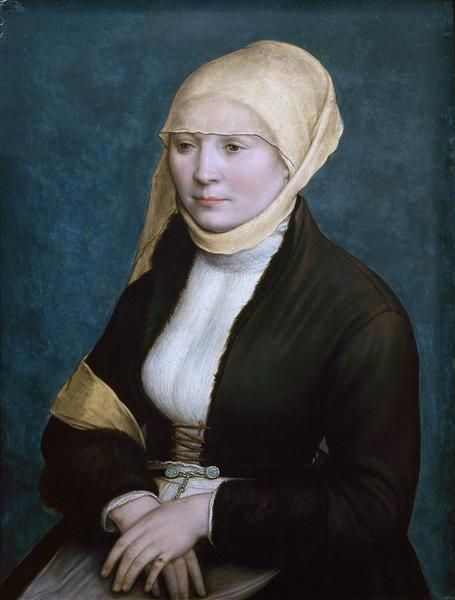Description
The work "Portrait of a South German Woman" painted in 1523 by Hans Holbein the Younger is an outstanding testimony of the Northern Renaissance, a period where attention to detail and psychological insight into the subject were exquisitely intertwined. In this portrait, the female figure is presented with a dignity that resonates in the gaze and posture, fusing the personal with the intimate cultural aspects of the time.
The woman is depicted in close-up, against a dark background that contrasts sharply with her clothing, which not only draws the viewer’s gaze to her face, but also allows her figure to glow with an almost ethereal luminosity. Holbein was a master of colour, and in this work we can see his skill in playing with a palette that combines rich black and grey tones with the golden glow of the ornaments on her clothing. The choice of these colours is not arbitrary; rather, it reinforces the perception of the woman as a status figure, perhaps belonging to a well-to-do family in southern Germany.
The treatment of the face is imbued with remarkable verisimilitude, with delicate features that reveal an emotional connection between the model and the viewer. The serene expression, framed by a headdress that falls elegantly over her hair, suggests quiet nobility and a materiality that seems to invite contemplation. Although the exact identity of the woman is not known, her presence on the canvas speaks of Holbein's deep interest in portraying not only appearance, but also the essence of the human being.
A fascinating aspect of Holbein's technique is his precision in detail. Every fold of fabric, every glint of light on the jewelry adorning the dress, and the texture of the skin are exemplary of his meticulous approach to portraiture. This refinement in depiction is a reflection of the Renaissance desire to capture reality as accurately as possible, resulting in a deep bond between art and close observation of the natural and human world.
Hans Holbein the Younger, as a contemporary of iconic artists such as Albrecht Dürer, contributed to a tradition of portraiture in which the subject’s personality was communicated through aesthetics. His portraits, characteristic of his style, often mix elements of realism with symbolism, a play that can also be perceived in this work. Although the portrait is presented frontally, the details of the woman’s costume and headdress lend an air of mystery that invites speculation about her status and the narrative behind the portrait.
The artistic context of Holbein's time, which encompasses both his Northern European influences and his close relationship with Italian art, is reflected in the serenity and introspection displayed by the subjects of his works. "Portrait of a South German Woman" is representative of this amalgam of styles, and although not as much is known about this specific portrait, its timeless quality leads us to reflect on the survival of themes of identity, class, and the representation of the self. The work is presented as a gem within the collection of Renaissance portraits, highlighting the mastery of an artist who knew how to capture not only the external image, but also the essence of the human soul.
KUADROS ©, a famous painting on your wall.
Hand-made oil painting reproductions, with the quality of professional artists and the distinctive seal of KUADROS ©.
Painting reproduction service with satisfaction guarantee. If you are not completely satisfied with the replica of your painting, we will refund 100% of your money.

